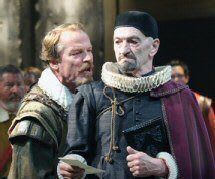It seemed as if the small Minerva theatre was being invaded as the troops of Prince Albrecht von Wallensteins army came roaring in, full of their riotous victory and ready to rape and pillage to their hearts content. A friar (Fergus ODonnell) berates them soundly for their behaviour and the havoc they have caused among the civilians, but these are the victors and the spoils of war are theirs. He is met with jeers.
This is the height of the seventeenth century Thirty Years War. Initially an attempt to overthrow the absolute dominance of the Catholic Church and its corrupt regime, the war escalated into numerous battles involving almost all the European powers, devastating land and wiping out whole communities, and if the plots and characters of this play seem confusing well, so was the war.
Wallenstein is commander-in-chief of the Imperial Army, successful and popular with his men, but not so popular with emperor Ferdinand II when he begins to disobey orders, and the emperors plan to place part of the army under the command of the Spanish Habsburgs does nothing to improve relationships, which are further strained when Count Octavio Piccolomini reveals to his son Max that he is the emperors man - a spy in Wallensteins camp.
Schiller kept mostly to historical fact, but Max is an extra character introducing a Romeo and Juliet type love interest between him and Wallenstein's daughter, Princess Thekla (a sweet and innocent Annabel Scholey). Extra emotional content is present as both these men regard Max as a son and strive for his affection and allegiance. Iain Glens Wallenstein looks mistily into the middle distance as he says with pride My boy!, while Anthony Calfs Count Octavio (the real father) is very expressive in his anguish and concern that his son is siding with another. Max Irons (son of Jeremy and proving his own worth as an actor) expresses well the plight of a young man torn three ways and wanting to do what is right.
There are enough battles, both physical and verbal, to satisfy the most avid drama seeker. Sebastian Armestos General Illo, indulging too much in the amber liquour, becomes a very convincing belligerent drunk, lashing out with his sword and beginning a superbly executed and staged fight where the clashing of blades threaten to do serious damage, and Charlotte Emmersons Countess Terzky has some exceptionally heartfelt speeches, inciting the men to what she believes to be best, but regretting her advice as events unfold.
Glen is a fine actor, but I found him unconvincing as a soldier, a leader of men, while Denis Conways demeanour as General Buttler - bluff, solid, dependable - seemed more realistic. ODonnell, now a Swedish colonel attired in sinister black, is a commanding presence as he arranges an alliance with Wallenstein each believing they were supping with the devil.
Robert Innes Hopkins dark satanic set broods over the scene, be it the Town Hall at Pilsen where the army is based, the Mayors house at Eger, or Eger Castle where Wallenstein finally meets his end.
Director Angus Jackson keeps intrigue and anticipation high with swift and unobtrusive changes of venue, but the final scenes with their long impassioned speeches tend to slow the pace, and I dread to think how I would have survived an earlier version reputedly ten hours long.
Interesting historically, engaging emotionally, and fascinating to watch mans never ending struggle for power.
Until 13th June
